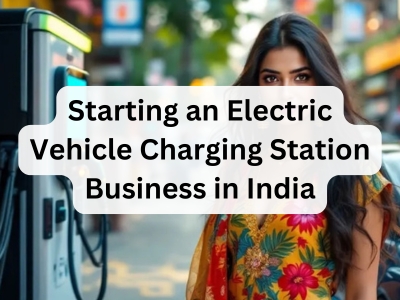Starting an Electric Vehicle Charging Station Business in India: A Complete Roadmap for Success
 The Electric Vehicle (EV) market in India is growing exponentially, driven by the government’s push towards sustainable mobility and the rising demand for eco-friendly transportation. With the EV market expected to grow at a CAGR of 36% by 2030, the need for EV charging infrastructure is more critical than ever. Starting an Electric Vehicle Charging Station Business in India presents a lucrative opportunity for entrepreneurs to tap into this fast-growing industry. For those looking to start a business in India, this sector offers immense potential.
The Electric Vehicle (EV) market in India is growing exponentially, driven by the government’s push towards sustainable mobility and the rising demand for eco-friendly transportation. With the EV market expected to grow at a CAGR of 36% by 2030, the need for EV charging infrastructure is more critical than ever. Starting an Electric Vehicle Charging Station Business in India presents a lucrative opportunity for entrepreneurs to tap into this fast-growing industry. For those looking to start a business in India, this sector offers immense potential.
Why Starting an Electric Vehicle Charging Station Business in India is a Smart Move

The Electric Vehicle Charging Station Business involves setting up infrastructure to charge EVs, catering to a growing base of EV owners. India’s push for electrification, supported by government subsidies and incentives, has created a favorable environment for this industry. Entrepreneurs can benefit from India company incorporation services to streamline the setup process.
Reasons to Start This Business

- High market demand due to the rapid growth of the EV market in India.
- Government incentives like subsidies under the FAME II scheme.
- Low competition in a relatively nascent industry with high growth potential.
- Opportunities to partner with automakers and energy providers for operational support. Businesses can also leverage business advisory services to create a strategic roadmap.
Why You Should Start an Electric Vehicle Charging Station Business in India

India offers a unique advantage as a regional hub for EV infrastructure development, with its large population and growing urbanization. Entrepreneurs can seek assistance from a corporate service provider or accounting firm in India to navigate the setup process. The government’s focus on renewable energy and electric mobility provides a conducive environment for entrepreneurs.
Detailed Steps to Establish Your Electric Vehicle Charging Station Business

1. Pre-establishment Phase
Before starting your Electric Vehicle Charging Station Business, conduct thorough market research to identify demand hotspots and target audiences. Analyze competitors to understand pricing strategies and service offerings. Choose a business model, such as pay-per-use or subscription-based services, that aligns with your target market. Additionally, determine the ideal location, such as highways, urban centers, or residential areas, to maximize customer reach. Refer to our India company registration guide for more insights.
2. Business Setup
Choose the legal structure for your business, such as a sole proprietorship, partnership, or private limited company. Register your business with the Ministry of Corporate Affairs and obtain a GST registration. You can explore incorporation services in India or foreign company registration in India for professional assistance. Infrastructure setup includes procuring EV chargers, installing energy meters, and ensuring compliance with safety standards.
3. Operational Planning
Plan resource allocation effectively, including hiring skilled staff for station management and maintenance. Invest in technology for real-time monitoring of charging stations and payment processing. Implement quality control measures to ensure uninterrupted service. Create Standard Operating Procedures (SOPs) to streamline operations and enhance customer experience. For financial management, consider professional accounting services or bookkeeping services to maintain accurate records.
4. Marketing and Business Development
Focus on building a strong brand presence through digital marketing and social media campaigns. Collaborate with automakers and fleet operators to establish partnerships and expand your customer base. Highlight your station’s unique selling points, such as fast charging or renewable energy integration, to attract customers. Establish a robust online presence with a user-friendly website and mobile app for easy booking and payment. Consider human resource management software to streamline employee management and operations.
Local Regulations and Licensing

Starting an Electric Vehicle Charging Station Business in India requires compliance with various regulations and obtaining necessary licenses. Here are some key requirements:
- Obtain a No Objection Certificate (NOC) from the local electricity board.
- Comply with guidelines issued by the Ministry of Power for EV charging infrastructure.
- Ensure adherence to safety standards outlined by the Central Electricity Authority (CEA).
- Register your charging station with the Bureau of Energy Efficiency (BEE) for certification and incentives. For additional support, explore company secretary services.
Challenges and Considerations

While the Electric Vehicle Charging Station Business offers immense potential, it also comes with challenges. Entrepreneurs must address market competition, manage high initial investment costs, and navigate regulatory complexities. Here are some common challenges and actionable tips to overcome them:
- High infrastructure costs: Explore government subsidies and partnerships to reduce capital expenditure.
- Market competition: Differentiate your services with unique features like renewable energy integration or loyalty programs.
- Regulatory compliance: Stay updated on industry-specific guidelines and hire legal experts for smooth operations.
- Customer adoption: Educate EV owners about the benefits of using your charging station through marketing campaigns. For strategic advice, consider corporate consulting services.
Financial Planning Aspects

Financial planning is crucial for the success of your Electric Vehicle Charging Station Business. Entrepreneurs must account for initial setup costs, operational expenses, and revenue projections. Here are some financial aspects to consider:
- Initial investment: Costs include land acquisition, EV chargers, and infrastructure setup.
- Operating costs: Include electricity bills, staff salaries, and maintenance expenses.
- Funding options: Explore government loans, venture capital, or crowdfunding for financial support.
- Tax considerations: Register for GST and ensure compliance with tax regulations to avoid penalties. For automated solutions, consider AI accounting software.
Conclusion
The Electric Vehicle Charging Station Business in India offers a promising opportunity for entrepreneurs to capitalize on the growing EV market. With proper planning, compliance, and execution, you can build a thriving business in this emerging industry.
Ready to Start Your Electric Vehicle Charging Station Business?
If you’re ready to take the next step, 3E Accounting is here to help. Our expert team provides end-to-end support, including business registration, compliance, and financial planning. Contact us today to schedule a consultation and turn your entrepreneurial vision into reality.
Don’t wait—start your journey in the Electric Vehicle Charging Station Business now and be part of India’s sustainable future. For more guidance on creating a comprehensive business plan, visit our resources section.


